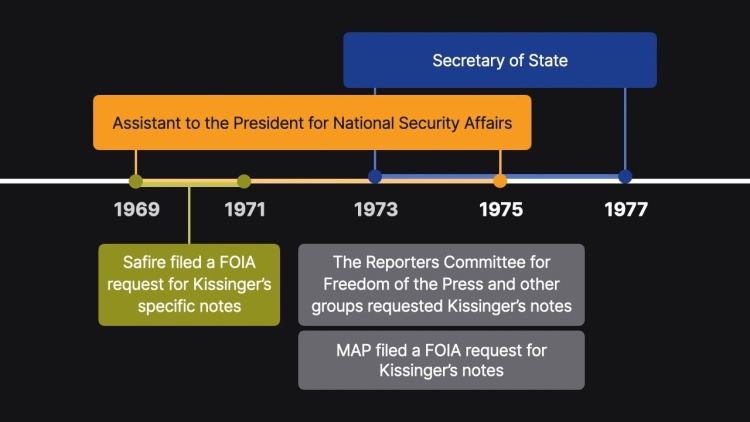Kissinger v. Reporters Committee for Freedom of the Press
United States Supreme Court
445 U.S. 136 (1980)
- Written by Peggy Chen, JD
Facts
Henry Kissinger served in both the Nixon and Ford administrations. Kissinger became assistant to the President for National and Security Affairs in January 1969. He was then appointed secretary of state in September 1973, but retained his National and Security Affairs position until November 3, 1975. Kissinger then continued to serve as secretary of state until January 20, 1977. During this period, Kissinger’s secretaries monitored his telephone conversations and prepared detailed summaries and sometimes transcripts of his telephone conversations. The conversations discussed personal matters as well as official business. The documents were stored at the State Department. On October 29, 1976, Kissinger arranged to move the telephone notes to the New York estate of Nelson Rockefeller. Kissinger did not consult the offices responsible for implementing the State Department’s records maintenance and disposal program or the office responsible for records preservation throughout the federal government. After the notes were transferred, Kissinger entered into agreements with the Library of Congress to deed it his private papers, including the notes. On December 28, 1976, the transcripts were transported from the Rockefeller estate to the Library of Congress. Three requests were made for Kissinger’s telephone notes under the Freedom of Information Act (FOIA). The first was made by William Safire on January 14, 1976. Safire requested only telephone notes of conversations between January 21, 1969 and February 12, 1971 for a limited category of conversations. The second was made by the Military Audit Project on December 28 and 29, 1976, after Kissinger’s notes were moved to the Library of Congress. The third was made by the Reporters Committee for Freedom of the Press (RCFP) and others on January 13, 1977. RCFP and MAP request all of Kissinger’s telephone notes from when he served as secretary of state. The court of appeals ordered the State Department to retrieve and produce Kissinger’s telephone notes for the MAP and RCFP requests. The court of appeals denied Safire’s requests on the grounds that the notes requested were not agency records because they were made when Kissinger was a national security adviser and advisers to the president are not considered agencies under the FOIA. Kissinger appealed.
Rule of Law
Issue
Holding and Reasoning (Rehnquist, J.)
Concurrence/Dissent (Stevens, J.)
What to do next…
Here's why 899,000 law students have relied on our case briefs:
- Written by law professors and practitioners, not other law students. 47,000 briefs, keyed to 994 casebooks. Top-notch customer support.
- The right amount of information, includes the facts, issues, rule of law, holding and reasoning, and any concurrences and dissents.
- Access in your classes, works on your mobile and tablet. Massive library of related video lessons and high quality multiple-choice questions.
- Easy to use, uniform format for every case brief. Written in plain English, not in legalese. Our briefs summarize and simplify; they don’t just repeat the court’s language.





